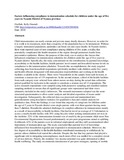| dc.description.abstract | Child immunization can easily contain and prevent many deadly diseases. However, in order for it to work to its maximum, more than a majority of the population has to be immunized. Without a largely immunized population, epidemics can break out and cause deaths. In Nyando district, there were reported cases of non-compliance among children of five years; a reality that potentially complicated the health situation of the region through premature deaths from preventative epidemics.
Hence, the purpose of this study was to analyze the factors that influenced compliance to immunization schedules for children under the age of five years in Nyando district. Specifically, the study concentrated on the contributions by parental knowledge, accessibility to the health facilities, health partners' involvement and household income levels on compliance to the immunization schedules. Towards this accomplishment, the study targeted collecting data from household respondents (preferably mothers with children under five years) and health officials designated with immunization responsibilities and working in the health facilities available in the district. There were 5 households in the sample from each division, to constitute a stratum size of 135 respondents.
In the second stratum, a third of the health facilities from each category were selected from where nurses on-duty during the actual data collection period qualified for inclusion in the sample to constitute a stratum size of 13 respondents. The active research respondents were sampled using both purposive sampling and stratified random sampling methods to ensure that all significant groups were represented and their views ultimately included in the study's inferences.
The research instruments adopted was the semi-structured questionnaires to allow easier analysis and detailed exposition of issues under investigation. Subsequently, the collected data was processed and manipulated into generalizations using descriptive statistics for quantitative data and content analysis for qualitative data. From the findings, it was found that majority of caregivers for children under the age of 5 years in Nyando district were single parents with over three quarters having more than 5 children. Households admitted challenges in complete adherence to immunization mainly as a result of inaccessibility to health facilities.
One had to travel an average of 2.5 kilometers to access a nearby health facility with 38% using bicycles when seeking immunization services in the facilities. 52% of the immunization demand was of reach by the government while most Non Governmental Organizations focused predominantly on pro-poor programmes aimed at uplifting livelihoods. 63% of the parents were in informal employment and they still accommodated other dependants of immunization age.
The study concluded that parental level of knowledge influenced how households regarded and responded to immunization schedule. Moreover, the low degree of accessibility to the health facilities contributed enormously to withdrawals by parents whose children had started the schedule. Despite the fact that key partners had played a significant role in mitigating noncompliance, much more effort was needed for a complete circuit of service delivery.
Finally, the residents' low income potential was quite detrimental to their health wellbeing. The study recommends introduction of pro-poor strategies, opening of mobile facilities in all sub-locations, modernizing road networks and supporting of private health facilities to reduce ultimate costs borne by immunization seekers. However the study was limited to Nyando district and the four variables. Further research can be carried out in other marginalized districts and on models of mass sensitization of the population on immunization. | en_US |

